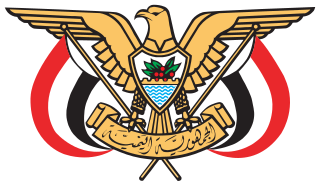
The prime minister of the Republic of Yemen is the head of government of Yemen.

Lahij is a governorate of Yemen.
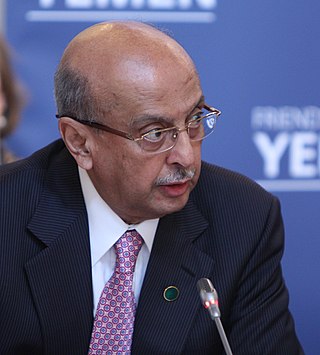
Abu Bakr Abdullah al-Qirbi is a Yemeni diplomat who was Minister of Foreign Affairs of Yemen from 2001 to 2014. He later also held the same role in the Houthis' contested cabinet formed in 2016, in spite of his former opposition to the Houthis.

Abdrabbuh Mansur Hadi is a Yemeni politician and military officer who served as the second president of Yemen from 2012 until his resignation in 2022. He previously served as the second vice president of Yemen from 1994 to 2012 under President Ali Abdullah Saleh.
Muhammad Umar Bahah is a Yemeni writer and journalist. Originally from South Yemen, he wrote for several newspapers and was press secretary of Ali Nasir Muhammad, two-time president of South Yemen. Bahah's work has been translated into English and Italian and was included in the anthologies Oranges in the Sun (2006) and Perle dello Yemen (2009).

The Cabinet of Yemen refers to the governing body of the internationally recognized government of the Republic of Yemen, led by its President Rashad al-Alimi, who is also the chairman of the Presidential Leadership Council (PLC), the governing body of Yemeni republic.
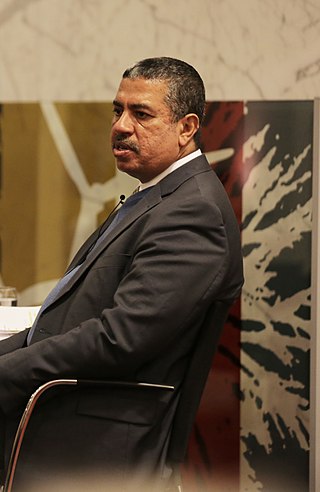
Khaled Mahfoudh Bahah is a Yemeni politician and diplomat who served as Prime Minister of Yemen between 2014 and 2016, as well as Vice President of Yemen from 2015 until he was dismissed on April 3, 2016, by the former President of Yemen Abdrabbuh Mansur Hadi.
Mohammed Salim Basindawa is a Yemeni politician who was Prime Minister of Yemen from 10 December 2011 to 24 September 2014.

The Houthi takeover in Yemen, also known by the Houthis as the September 21 Revolution, or 2014–15 Yemeni coup d'état, was a popular revolution against Yemeni President Abdrabbuh Mansur Hadi led by the Houthis and their supporters that pushed the Yemeni government from power. It had origins in Houthi-led protests that began the previous month, and escalated when the Houthis stormed the Yemeni capital Sanaa on 21 September 2014, causing the resignation of Prime Minister Mohammed Basindawa, and later the resignation of President Abdrabbuh Mansur Hadi and his ministers on 22 January 2015 after Houthi forces seized the presidential palace, residence, and key military installations, and the formation of a ruling council by Houthi militants on 6 February 2015.
The following lists events that happened during 2014 in Yemen.

The following lists events that happened in 2015 in Yemen.

The Yemeni crisis began with the 2011–2012 revolution against President Abdullah Saleh, who had led Yemen for 33 years. After Saleh left office in early 2012 as part of a mediated agreement between the Yemeni government and opposition groups, the government led by Saleh's former vice president, Abdrabbuh Mansur Hadi, struggled to unite the fractious political landscape of the country and fend off threats both from Al-Qaeda in the Arabian Peninsula and from Houthi militants that had been waging a protracted insurgency in the north for years.
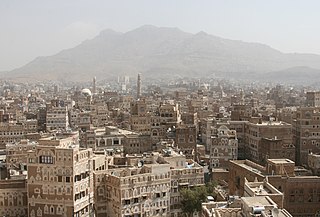
The Battle of Sanaa in 2014 marked the advance of the Houthis into Sanaa, the capital of Yemen, and heralded the beginning of the armed takeover of the government that unfolded over the following months. Fighting began on 9 September 2014, when pro-Houthi protesters under the command of Abdul-Malik al-Houthi marched on the cabinet office and were fired upon by security forces, leaving seven dead. The clashes escalated on 18 September, when 40 were killed in an armed confrontation between the Houthis led by military commander Mohammed Ali al-Houthi and supporters of the Sunni hardliner Islah Party when the Houthis tried to seize Yemen TV, and 19 September, with more than 60 killed in clashes between Houthi fighters and the military and police in northern Sanaa. By 21 September, the Houthis captured the government headquarters, marking the fall of Sanaa.

Saleh Ali al-Sammad was a Yemeni political figure from the Houthi movement who served as the chairman of Yemen's Supreme Political Council and the de facto President of Yemen until his assassination.

The aftermath of the Houthi takeover in Yemen refers to developments following the Houthis' takeover of the Yemeni capital of Sana'a and dissolution of the government, which eventually led to a civil war and the Saudi Arabian-led intervention in Yemen.

Abdel-Aziz bin Habtour is a Yemeni politician who served as prime minister of Houthi-led government in Sanaa from 4 October 2016 to 10 August 2024. On Saturday, August 10, 2024, Bin Habtour was appointed as a member of the Supreme Political Council. He also served as Governor of Aden during the Houthi takeover in Yemen. He is a member of the General People's Congress, sitting on its permanent committee since 1995. An ally of President Abdrabbuh Mansur Hadi, he condemned the 2014–15 Yemeni coup d'état and received the deposed leader after his flight from the Houthi-controlled capital of Sanaa on 21 February 2015. He is also a vocal opponent of the separatist movement in the former South Yemen, saying the movement is too fractured and small to achieve its goals.
Major general Mahmoud al-Subaihi is a Yemeni military officer. He served in the cabinet of President Abdrabbuh Mansur Hadi as defence minister. In the Yemen Army, he holds the rank of major general. He was appointed to head the Ministry of Defence by Prime Minister Khaled Bahah in November 2014.
Muhammad Musa al-Amri is a Yemeni politician. He is the leader of al-Rachad party in Yemen, and he was appointed as Minister of State on 7 November 2014 as part of Khaled Bahah's cabinet. He remained in office even after the 2014 coup carried out by the Houthis that led Bahah's government to resign on 22 January 2015.

Nayef al-Bakri is a Yemeni politician who serves as minister of youth and sports in the cabinet of Prime Minister Khaled Bahah. He was appointed in mid-September 2015, succeeding Rafat Al Akhali.
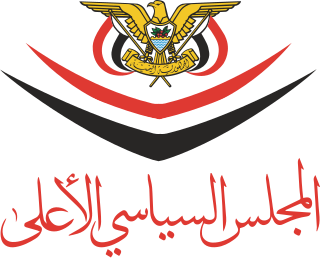
The Supreme Political Council is an extraconstitutional collective head of state and executive established in 2016 in Sanaa by the Houthi movement and the pro-Houthi faction of the General People's Congress (GPC) to rule Yemen opposed to the Presidential Leadership Council (PLC) in Aden. The SPC carries out the functions of head of state in Yemen, appointing the country's cabinet and managing the Yemen's state affairs in a bid to fill in political vacuum during the Yemeni Civil War. The Council aims to outline a basis for running the country and managing state affairs on the basis of the constitution. Since 2018 the SPC has been headed by Mahdi al-Mashat as Chairman of the Council.

















